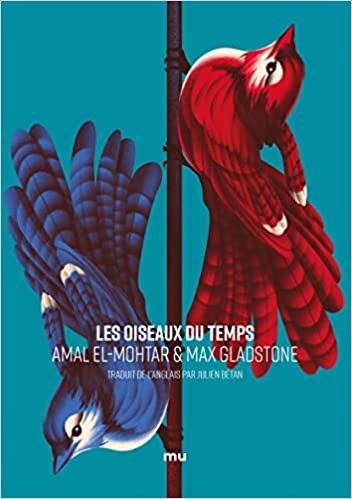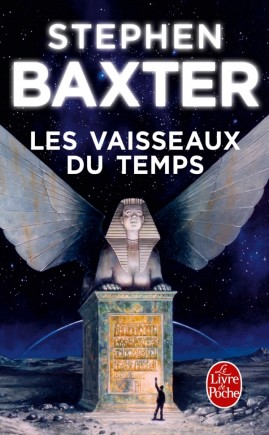1. | Castaways of the Fermi Institute by André David
Two camps clash, the dinghies and the travelers. Drifters can travel through time thanks to the genetic heritage they share with their ancestors, it is by taking possession of the latter’s body that a dinghy influences the future. While theTravelers, on the other hand, use more traditional technology because they come from “the future” (beyond the contemporary era of dinghies). These two camps clash because the travelers belong to a postapocalyptic world dominated by spider-city populated by clones, on a cold and desolate Earth… Strange situation because the objective of the drifters is however to thwart the Fermi paradox (true scientific case): the civilizations wishing to extract themselves from their planet of origin self-destruct before having been able to meet each other, otherwise we would have already met them… The drifters therefore take themselves for saviors even as their descendants try to prevent them from carrying out their mission of survival of Humanity. A complex plot as we like them !
Find our interview with the author right here:
For more details on the plot and the style, we invite you to discover our column on the novel. Here we prefer address everything that underlies the text. The castaways of the Fermi Institute is above all a quest for meaning, both for Louis, the almost depressive dinghy, and Gwen, the traveler who finds in her mission the way to overcome all the hardships she lives. This sense, they seem to find it in their team and in the people they rub shoulders with: what’s the point of saving the world if you won’t be well surrounded at the end of the story?
Beyond Pure Time Travel Work – including magnificent journeys through the ages – the genetic approach to the plot raises many questions. Whether it is on the cloning shown by our future descendants in their spider cities, or on the physical and psychic takeover of the hosts of the drifters. Where is the free will when we all look alike and our body is destined for a single and unique task? André David addresses these questions through moments of pause for his characters, as if they were breathing and debriefing their mission, alone in their corner – giving a very intimate and human approach of these sciences!
The Castaways of Fermi Institute is a great discovery for all those in search of reflections, action and adventures! We warmly recommend!
–
2. | The Birds of Time by El-Mohtar & Gladstone

Blue and Red love each other from afar. They are on opposite sides but yet love pushes them to leave each other letters wherever the temporal war rages ! This exchange of letters across the worlds and the impalpable confines of infinity then gives this long-distance relationship a unique aura of its kind, so much does it seem to have no imaginable scope.
The two authors draw us here their portrait of two possible futures for Humanity : The Agency and technology against the Garden and the symbiosis with plants. Two camps that cannot understand each other and yet that is what this novel is all about: understanding and loving the Other.
Each chapter is an opportunity to discover a new time and an amazing place – which makes it all the more enjoyable to discover the encrypted messages left by one or the other – which are all places where the absurdity of war is glaring. The world is sometimes on fire and blood and worlds are constantly collapsing!
The Birds of Time represents a revival in contemporary science fiction by offering us a sensitivity that has never been seen before. Where science fiction strives to describe the future of Humanity facing extraterrestrials or facing new societies enabled by advanced technology, here science fiction is only a backdrop to a love story that leaves no one indifferent!
–
3. | The Ships of Time by Stephen Baxter

When ends The Time Machinethe Traveler is about to set off again in the future to save Weena, the charming Eloï, threatened by the cruel Morlocks. Stephen Baxter, 100 years after the original work, reinvents the story of HG Wells. And the Traveler is not at the end of his surprises because in the future, the Morlocks are no longer the hideous scum of Humanity, but many technologically dominant beings who no longer look like barbarians! It’s a real journey through the centuries that Baxter offers us!
Stephen Baxter’s modern writing is much lighter and more modern than that of Wells, but we can’t help but find a welcome echo! It takes the reader as much into the future as into the past, to the beginnings of the Universe. And the Time Traveler observes the changes in the climate and the evolution of science, and wonders about what they can imply on our human societies. Like all good science fiction authors, he enjoys highlighting or creating paradoxes between matter and time, and we come out interested in all these concepts which reinforce the idea of a coherent universe!
We must recognize the author that he knew how to write a roman magistral d’anticipation because the setting of Wells’s novel is only a setting for a story that is about theVERY VERY distant evolution of our Humanity and on our relationship with Time and what we leave behind!
The Time Vessels is a sweet treat for any science fiction fan!
–

